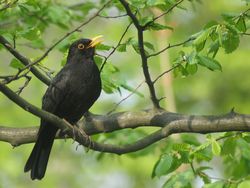Walk a Mile by Kaspa Thompson
This morning as I took my usual morning walk around the garden I heard a bird call that I didn’t recognise. I looked up and there was a female blackbird, with its mottled brown coat, sitting up high in the copper beech above me. It wasn’t singing the usual blackbird song. A warning call, I guessed, and turned around to see that one of my cats had followed me into the garden.
The cat, Tsuki, was sitting at the top of a few low steps. She - like all my cats - hates walking on grass. She stretched out in my direction when she saw me looking at her, and started that purr which means come over here and stroke me. I gave her some fuss and then carried on my walk, noticing what was growing, which flower beds needed weeding and the places where I was sure I had planted things that hadn’t come up yet. I noticed a couple of tadpoles swimming up to the surface of our small pond. Recently they have been keeping out of sight down in the deep waters. I have watched them change from gelatinous frog spawn, to tiny tadpoles, to bigger ones and I hope that some of them make it to adulthood.
It’s hard to imagine how all of these different creatures experience the world; impossible, perhaps. Naturalist Charles Foster tried to see through the eyes of animals by living in their world. To get closer to the experience of a badger he got right down to the forest floor, he dug a set to sleep in and emerged blindfolded, learning to navigate the world through scent and touch. Even then there is a gap: a badger brain is not a human brain.
Sometimes it seems just as difficult to imagine how life is for other people, even though we are all animals of the same species. We are all born into particular families, into particular cultures and into particular countries, each with their own quirks and standards of normal behaviour. Some of what we are handed down is good and some of what we are handed down less so. We meet someone with different experiences to us and think, "How can they like that?" or "Why are they doing that?". A gulf opens up between us.
Misunderstandings can happen even in the most intimate of relationships. We fail to notice how important something is to our partner, or we each happen to be prioritising different things and suddenly we are arguing or not speaking to each other at all.
Human beings don’t tend to like real change and so when we come into conflict much of our response is often about trying to get out of the conflict whilst avoiding changing or doing anything differently: we tell each other off, or try to use rational thought to work things out, or we run to a distraction. Suddenly there is a real danger of the conflict escalating and things being worse for us and the other person.
Empathy offers a way out of this situation. It’s amazing how really tuning in to what’s happening in the other person, and to what’s happening in us, can make a real difference.
Can we name our own feelings, rather than just acting habitually? Can we tune into the feelings of the other person? What is it about them that we’ve not seen or heard that has got us into this mess? Is there something about our own experience we are missing out?
We’ll never get 100% into someone else’s shoes. But really making an effort to get there, and to hear and see and feel more than we did before is an amazingly powerful and transformative practice. Empathy moves us towards understanding, reconnection and to working and living together more easily.
Kaspa Thompson is a psychotherapist, mindfulness teacher and Buddhist priest. For info on therapy and mindfulness classes see: www.kaspathompson.co.uk and for his local Buddhist group see:


